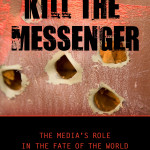Tackling Conflict with Creativity
By Ashley Murphy
Popularly known as the land of one thousand hills, Rwanda’s natural landscape is green and luscious despite being cultivated and heavily populated. As I traveled into Northern Province’s Rulindo District to visit a secondary school as part of SFCG’s unity and reconciliation project, I could not help but envy the students in residence. The setting of their education seems idyllic; the school is nestled into green mountains dotted with trees. Colorful birds call from the bushes, a rushing river flows nearby. The students seem to have correspondingly idyllic lives; during their lunch break I observe them holding hands, telling secrets, wrestling, lifting weights they fashioned from old milk cans. Yet just as each rolling hill holds its own story of turmoil from the 1994 genocide, each of the students harbors a private story. Many have lost family members, or are the children of perpetrators or survivors. While most are too young to have experienced the genocide firsthand, they experience the residual effects every day.
In partnership with Rwanda’s National Unity and Reconciliation Commission and with support from USAID, SFCG is using its innovative participatory theater tool to forge a space for dialogue to address these residual effects. Participatory theater encourages people to confront conflicts in an entertaining and creative way, playing out problems that the audience faces every day and inviting their participation in finding solutions. Through the performances, students are encouraged to address their differences and find a common ground, fight divisionism, and move forward as one. To represent this, the slogan of the participatory theater activity is Turi Umwe, meaning in the local language of Kinyarwanda, “We Are One”.
For the young Rwandan generation that did not directly experience the genocide of 1994 but does experience its residual effects, it can be difficult to fully address the layered and delicate past. Participatory theater therefore presents an alternative format for learning, where youth can participate and devise their own solutions to the genocide-generated problems they face. The art form helps coax out dormant and untapped personalities, opinions, and ideas. This is something I witnessed directly. As SFCG’s theater troupe broke the ice for 400 teenage students through music and dance, I became enraptured. There is something incredibly powerful about watching youth transform in front of your eyes, going from displaying shy, downcast expressions to grabbing a microphone and jumping into a skit.

Turi Umwe (“We Are One” in Kinyarwanda) is the slogan of this participatory theater program that helps empower young Rwandans to resolve conflicts in their everyday lives.
The enduring, indirect effects of the genocide were the centerpiece of performances, highlighting conflicts that affect students today. One particular skit involved two students fighting over whether it is acceptable to date the child of a perpetrator. Another centered on a fight between an orphaned survivor and a perpetrator’s child. Each of these performances engaged the audience by asking them their opinions of the conflict in question. Already pumped up from the music and dance, the audience cheered and clapped throughout the performances, showing their engagement and interest in the content. At the end of the performances, Christine, SFCG’s resident theater coordinator and actor, asked the audience if they encounter the same issues in school. Everyone vehemently agreed.
Opening dialogue does not come without challenges. The Rwandan staff has worked tirelessly with the National Unity and Reconciliation Commission (NURC) to strategize on how to approach such a sensitive subject. The theater troupe actors have themselves struggled to find a common ground on this topic and how it should be addressed. Yet for the reconciliation process to continue on a strong, straight path, what is required is for Rwandans of all generations and backgrounds to thoroughly exchange on various effects of the genocide and how to handle them. SFCG strives to support all Rwandans, regardless of ethnicity or background, in their efforts to accomplish this, and participatory theater is one way SFCG is able to approach the delicacy of the process.
Ashley Murphy is an international intern with SFCG in Kigali, Rwanda. She holds a bachelor’s degree from American University in International Studies.









